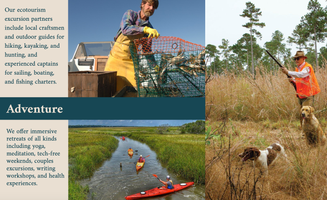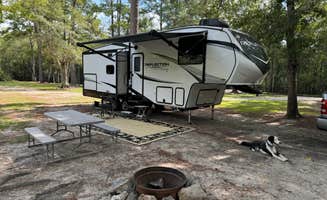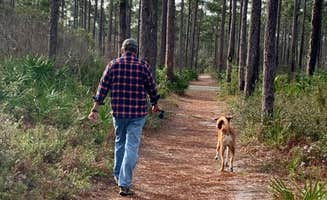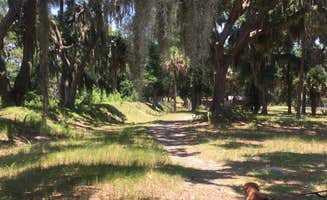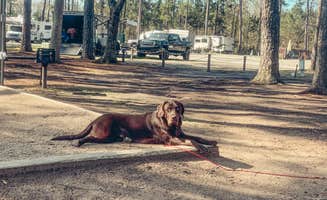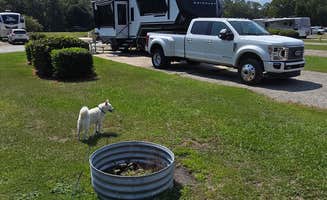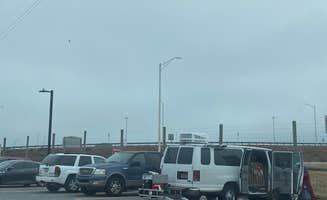Darien sits at the mouth of the Altamaha River on Georgia's coastal plain, where maritime forests meet tidal marshlands. The region's elevation averages just 10-30 feet above sea level, creating waterfront camping opportunities with distinctive wildlife viewing. Mosquitoes are prevalent from April through October at most campsites, particularly at dawn and dusk.
What to do
Fishing access: Blythe Island Regional Park offers extensive fishing opportunities from multiple locations. Stuart K. notes, "There's a great boat launch here for the biggest of sea vessels and the views (and fishing) from this area, whether on the pier or nearby are simply fantastic." The park maintains fishing docks with boat lifts and a bait shop.
Wildlife viewing: Observe local fauna at Blythe Island Regional Park, where natural habitat supports diverse species. "Loaded with bunnies and squirrels who don't mind humans. Drove our dog crazy the first day!" reports Liz M. The park's lake areas provide excellent viewing spots for birds and small mammals.
Beach exploration: Visit the nearby coastal islands for distinctive beaches. Patrick H. from Jekyll Island Campground shares, "Driftwood beach is walking distance and a must see!" The beach features weathered trees and driftwood formations creating a natural sculpture gallery.
What campers like
Clean facilities: Bathhouse quality varies between pet-friendly campgrounds. At Coastal GA RV Resort, Liz M. observed, "Restrooms very clean. Nice showers. Doors locked and keyed with code." The resort provides secured access to maintain bathroom cleanliness.
Spacious waterfront sites: Many campers appreciate lakeside camping options. Michael C. at Jekyll Island Campground states his site had "Very pretty campground setting. Quiet at night. Community room and a large assembly room." Most waterfront sites include extra space for gear and pets.
Security features: Gated access provides safety at several campgrounds. Sydney P. notes about Blythe Island Regional Park, "With a gate for seclusion, electric at sites, a packet for those arriving after hours, it was lovely." Security gates typically operate 24/7 with code access for registered guests.
What you should know
Site surface conditions: Ground types vary considerably between campgrounds. Nik J. notes about Jekyll Island Campground, "We stayed in site E6 and it was by far the most difficult back in site I have had to get into (camper is 27' hitch to bumper). So be aware and do your homework." Many sites feature natural sand or dirt rather than concrete pads.
Highway proximity: Several campgrounds sit near Interstate 95, creating potential noise issues. Sandy G. reports that Inland Harbor RV Park is "Easy on off from interstate. $40 full hookup. Small park. Bath house and laundry. Simple but perfect for overnight while getting to your destination... You can hear the interstate."
Seasonal wildlife concerns: Local wildlife impacts campers year-round. Ethan H. mentions about Blythe Island, "Great camping experience, very wooded and private in the primitive sites. Lots of no see ums." No-see-ums (tiny biting midges) are most active in warmer months, particularly after rainfall.
Tips for camping with families
Playground access: Multiple campgrounds offer dedicated children's play areas. Stuart K. describes Blythe Island: "There's tons of general park amenities - too many to go into detail (trust me, you'll be surprised and impressed)." The park maintains separate playground zones away from water features.
Swimming options: Water access varies across dog-friendly campgrounds. Tyler W. from Altamaha Regional Park shares, "Swimming area really fun. Only downside was boat ramps were unusually busy so the swimming area was a bit exhaust filled for a little while." Most swimming areas lack lifeguards; parental supervision required.
Wildlife education: Use local animal sightings for educational opportunities. Kristen R. notes, "I saw rabbits every day, which was fun. The RV sites are big, and the hookups worked well." Wildlife viewing is typically best around dawn and dusk at most campgrounds.
Tips from RVers
Maneuverability considerations: Site access varies significantly between parks. Stuart K. warns about Blythe Island, "What's with all of the long winding roads that seemingly lead to nowhere." Larger rigs should research specific sites in advance for turn radius and approach angle requirements.
Seasonal maintenance issues: Campground conditions fluctuate throughout the year. Liz M. observed at Coastal GA RV Resort, "It's not big (for larger dogs) and it would be nicer with a different surface (stone or chips) as it had really muddy areas." Many dog exercise areas become muddy after heavy rainfall, particularly in winter months.
Utility reliability: Power and water hookups typically function well at established campgrounds. Missy H. from Lake Harmony RV Park reports, "We had a wonderful time! Great fishing, they have a pond and a lake with paddle boat rentals. It's so quiet, and quaint." Most full-hookup sites provide 50-amp service and city water connections with good pressure.


